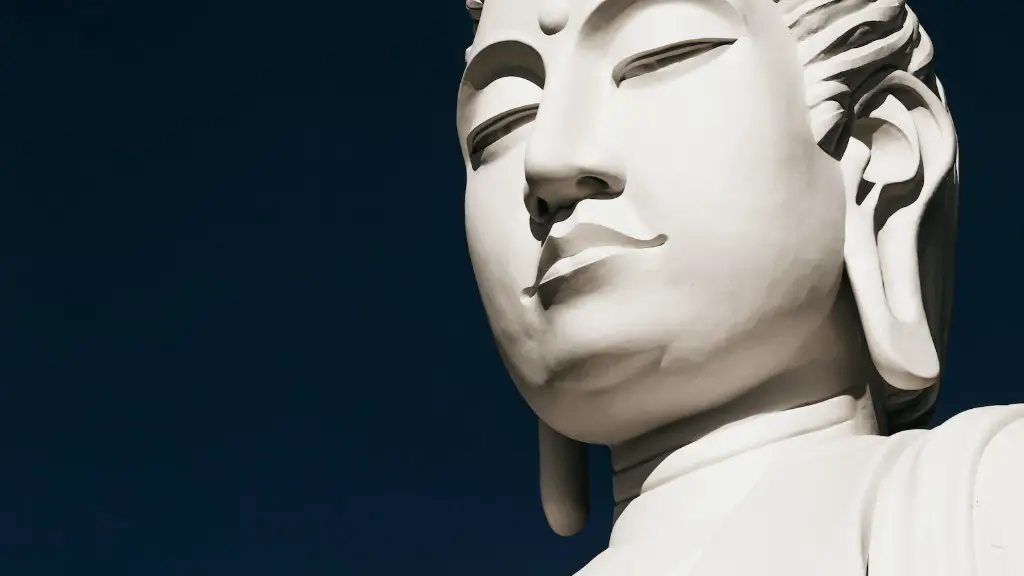Buddhism teaches that all things are impermanent and subject to change. This includes thoughts, feelings, and physical objects. Because of this, nothing has a fixed or permanent nature. This concept is called “emptiness.” It’s not that everything is literally empty, but rather that everything is transient and constantly changing. This can be a difficult concept to wrap your mind around, but it’s a central tenet of Buddhism.
In Buddhism, emptiness is the nature of all things. All things are empty of inherent existence. This means that things do not exist independently of other things, but depend on other things for their existence.
What does emptiness feel like Buddhism?
Emptiness is a mode of perception that can be used to look at experience. It doesn’t add or take away from the raw data of physical and mental events. You can use it to look at events in the mind and the senses without thinking about whether there’s anything behind them.
Emptiness is Form refers to a Buddhist text called the Heart Sutra, which is the distillation of all teachings on Emptiness. Emptiness in Buddhism refers not to nothingness, but to the opposite: the interdependence of all phenomena, both mental and physical.
What is a state of emptiness
In emptiness, also called Nothingness, or Void, the mind is emptied of all particular objects and images. This is a state of “pure consciousness” in which the mind reflects or experiences the undifferentiated reality (a world without distinctions and multiplicity).
The six rubrics which the notion of emptiness is used in the Zen tradition are lack of ownbeing, formlessness of ultimate reality, distinctionless state of meditative consciousness, no-mind in the action of non-action, emptiness (or emptying) of emptiness, and emptiness of words.
Lack of ownbeing means that there is no fixed, inherent nature to things. Formlessness of ultimate reality means that reality is not constrained by the forms and categories we impose on it. The distinctionless state of meditative consciousness refers to a state of consciousness beyond the usual subject/object duality. No-mind in the action of non-action means that in Zen, the goal is not to achieve a state of mindlessness, but to be aware and present in the moment without attachment or aversion. Emptiness (or emptying) of emptiness means that even the concept of emptiness is empty of inherent meaning. Emptiness of words means that language is ultimately inadequate to describe reality.
Does the emptiness ever go away?
Many people feel empty at some point in their lives. This feeling can last for a few days or longer. If you are feeling empty, it is important to recognize cognitive distortions and seek the support of a mental health professional.
The foundation practices for intuiting emptiness are compassionate and ethical conduct, and meditative focus. Compassion redirects focus away from the self and toward others, which helps prepare the mind for experiencing emptiness. Ethical conduct is also important for preparing the mind for emptiness, as it helps to develop discipline and focus. Meditative focus helps to develop the ability to concentrate and to see things clearly, both of which are necessary for understanding emptiness.
What are examples of emptiness of life?
The feeling of emptiness is a common symptom of many different life circumstances. The loss of a loved one, whether through death or separation, can leave one feeling empty and without purpose. A sudden change in life circumstances, such as a job loss or the end of a relationship, can also produce these feelings. The feeling that life lacks meaning is a common symptom of emptiness. If you are experiencing these symptoms, it is important to seek professional help to explore the underlying causes and to develop a plan to address them.
The emptiness teachings are at the heart of Mahayana and Zen Buddhist understanding and practice. Emptiness refers to the reality that nothing is permanent, everything comes and goes in a flash, and hence everything and everyone is “empty of self-nature,” that is, any abiding, substantial essence. The emptiness teachings help us to see through the illusory nature of our lives and to abandon attachments to things that are impermanent. In so doing, we can experience a deeper, more authentic sense of ourselves and the world around us.
How does emptiness lead to enlightenment
The concept of emptiness is central to Buddhism and is often used in regard to the nature of the world or things. This emptiness refers to the lack of a self or anything pertaining to a self. The enlightenment realized by this notion of Not-self is described as liberation of mind through emptiness. In essence, this emptiness is what allows us to see the world as it truly is and to be liberated from the suffering that arises from our attachment to things.
If you find yourself unable to stay in the moment or needing to escape through drugs or alcohol, it could be a sign of spiritual emptiness. According to Dr. Ananda, a lack of meaning and purpose can lead to depression, which can then lead to using substances to try to elevate mood. If you’re struggling with any of these symptoms, it’s important to reach out for help.
What causes emptiness?
There are many causes of emptiness, which can include the loss of a loved one or difficulty finding meaning and fulfillment in life. Other factors that may lead to a feeling of emptiness include boredom, stress, communication issues and lack of emotional connection with others. If you are feeling empty, it is important to find ways to connect with others and find meaning and purpose in your life.
There appears to be a distinction between loneliness and chronic emptiness – the former being attributable to a lack of social connections, while the latter is characterized by a disconnection from both self and others. For those experiencing chronic emptiness, it may be difficult to connect with others and establish meaningful relationships. Additionally, they may also have difficulty connecting with themselves, feeling lost and without direction. If you are feeling lonely or chronically empty, seeking professional help may be beneficial in order to explore the underlying causes and develop coping strategies.
What is the difference between emptiness and void
The Void is the frightening absence of something which was once there. It is the result of destruction which has not been grieved or healed. The Void is the product of something destroyed which has not been given the chance to mourn its loss.
The emptiness of the dharma of teachings refers to the fact that the teachings are empty of any inherent existence. They are simply a set of instructions that point to the nature of reality. The emptiness of the dharma of mind refers to the fact that the mind is also empty of any inherent existence. It is simply a field of awareness that is open to all experience.
What is the solution of emptiness?
There’s no shame in feeling lonely or empty sometimes. We all go through periods of feeling disconnected from others. The important thing is to not judge yourself for these feelings, and to be curious and compassionate towards yourself.
One way to overcome loneliness is to be a joiner. Seek out opportunities to connect with others, even if it’s just in a small way. Sharing your sense of emptiness with another person can also be helpful. They may be able to relate to you and provide some comfort.
If you’re feeling empty and lifeless, it’s important to reach out for help. This is a common symptom of anxiety disorder, and there are many resources available to help you cope. Talk to your doctor, therapist, or a trusted friend or family member to get started on the path to recovery.
Can you fill emptiness
Building self-esteem is an important part of a happy and fulfilling life. It’s important to remember that you are the only one who can control how you see yourself. You are the only one who can decide whether you are valuable and worthy of love and respect. Take the time to appreciate all the good things about yourself, both inside and out. Fill your life with positive people and activities that make you feel good about yourself. Avoid anything that brings you down or makes you feel bad about yourself. Surround yourself with people who love and support you, and who will help you build a strong sense of self-esteem.
Chronic emptiness can be described as feeling disconnected from oneself and, less frequently, from others. Individuals may feel numb and may have difficulty experiencing emotions. Chronic emptiness is often associated with depression, anxiety, and substance abuse.
Warp Up
In Buddhism, emptiness is the absence of inherent existence. This means that things do not have an inherent, unchangeable nature. Everything is constantly changing and is therefore empty of any fixed essence. This includes our own sense of self. We are not permanent, unchanging beings, but are ever-changing, impermanent beings.
In Buddhism, emptiness is the lack of inherent existence of all things. This means that everything is empty of any permanent, unitary, independently existing self or essence. Emptiness is not a property of things, but rather the lack of such a property.



